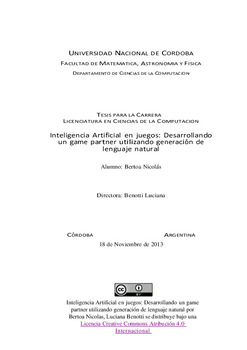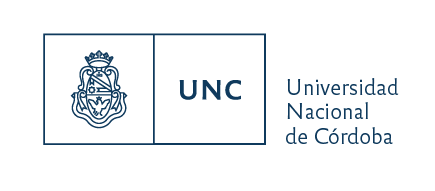| dc.contributor.advisor | Benotti, Luciana | |
| dc.contributor.author | Bertoa, Nicolás | |
| dc.date.accessioned | 2021-09-03T18:17:32Z | |
| dc.date.available | 2021-09-03T18:17:32Z | |
| dc.date.issued | 2013 | |
| dc.identifier.uri | http://hdl.handle.net/11086/20097 | |
| dc.description | Tesis (Lic. en Cs. de la Computación)--Universidad Nacional de Córdoba, Facultad de Matemática, Astronomía y Física, 2013. | es |
| dc.description.abstract | Actualmente la mayoría de los tutoriales en los videojuegos están hechos para que el jugador siga un script fijo. Por lo tanto, que un tutorial sea bueno o malo es todavía un arte que depende de cuán bueno sea el script para hacernos creer que como jugadores tenemos libertad (por ejemplo, prediciendo posibles reacciones del jugador) con el fin de hacer el juego más entretenido. Para la industria de videojuegos, los tutoriales son caros de desarrollar porque los programadores deben predecir todas las posibles reacciones del jugador. La generación de lenguaje natural puede proveer a los game designers de técnicas que, en el futuro, podrían transformar el arte del diseño de tutoriales en una ciencia que ofrezca diferentes puntos de vista y algoritmos eficientes para el cálculo del conocimiento del jugador y así poder lidiar con sus reacciones de forma dinámica. | es |
| dc.description.abstract | Currently, in most video games tutorials, the player follows a fixed script. Thus, to decide if a tutorial is good or not is an art that depends on the script quality to make believe the player that he has freedom (for example, predicting possible player's reactions) with the goal to make the game more entertaining. For the video games industry, the tutorials are expensive to implement because the developer must predict all the possible player's reactions. The natural language generation can provide the game designers with techniques that, in the future, can transform the art of tutorial design in a science that offers a different point of view and efficient algorithms to get the player's knowledge and to be able to deal with his reactions in a dynamic way. | en |
| dc.language.iso | spa | es |
| dc.rights | Atribución 4.0 Internacional | * |
| dc.rights.uri | http://creativecommons.org/licenses/by/4.0/ | * |
| dc.subject | Inteligencia artificial | es |
| dc.subject | Generación de lenguaje natural | es |
| dc.subject | Artificial intelligence | en |
| dc.subject | Natural language processing | en |
| dc.subject | Language generation | en |
| dc.subject | Planning | en |
| dc.subject | Common ground | en |
| dc.subject | Gaming | en |
| dc.title | Inteligencia artificial en juegos : desarrollando un game partner utilizando generación de lenguaje natural | es |
| dc.type | bachelorThesis | es |
| dc.description.version | publishedVersion | |
| dc.description.fil | Fil: Bertoa, Nicolás. Universidad Nacional de Córdoba. Facultad de Matemática, Astronomía y Física; Argentina. | es |





